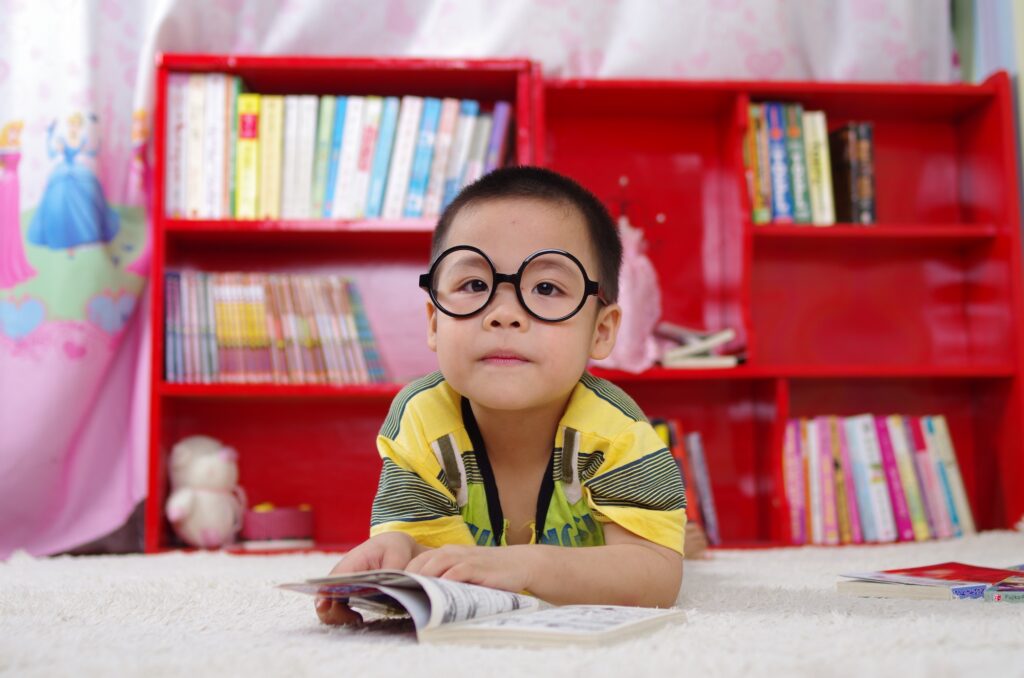No parents on earth want to see their child in pain, discomfort, and lagging behind other kids. Children over three years of age can easily communicate. They can inform their parents about pain and discomfort, but detecting a vision problem is difficult for kids and parents, this is why they may need eyeglasses.
The undetected vision problem can have multiple impacts on kids. It impacts their physical health, the kids’ performance in the classroom, and their social lives. Many parents fail to realize that their kids’ poor performance and not engaging in different activities with other kids can be due to vision problems and the need for eyeglasses.

So the important thing is that parents and the teachers should pay attention to the vision of their kids, and if they find any symptoms of vision problems, then the kid should be examined by the eye doctor.
This article will tell you some telltale symptoms and signs that your child needs prescription glasses.
10 Symptoms To Know If Your Child Needs Eyeglasses
Symptoms of vision problem in kids
Some children have vision defects by birth, and some develop them later in childhood. It is also said that children’s vision gets fully developed at the age of seven or eight, and sometimes during the development phase, some children may need prescription glasses to aid the development. Some of the common reasons the kids may need to wear glasses are correcting vision, strengthening the vision in the lazy eye (amblyopic), improving the crossed eyes’ position, and protecting the eyes in case of vision impairment in only one eye.
It’s not a secret that getting adjusted to wearing eyeglasses daily takes time for adults, let alone for kids. The frame may be too heavy at first on the nose. The child may feel some fatigue and discomfort in their eyes and may even need to reconsider their playing habits such as running or engaging in active sporting activities that may result in a fall. However, certain conditions require children to wear glasses at all times. Fortunately, many brands such as Overnight Glasses, Warby Parker, and Zenni Optical offer a large variety of high-quality prescription glasses

for kids. The difference here is not only the size but also the design of the frames. Child-friendly and colorful framed glasses will, for sure, find their way into every kid’s heart and lessen the struggles of parents trying to keep the specs on their kid’s face every minute of every day.
So without further ado, let’s discuss the symptoms that show your child needs eyeglasses.
Squinting Eyes
Squint in the eyes is a significant indication that kids have a vision problem. Typically the squinting eyes are a sign of refractive error. To see better and focus the image, the kids squint the eyes because the squinting reduces the object’s size and makes it easier for them to focus.
Children also squint their eyes in reaction to strong and bright light. Squinting reduces the amount of light entering the eye and helps the children focus on the object. So if you catch your kid narrowing his or her eyes, you should take your child for an eye examination.

Rubbing Eyes
If your child is constantly rubbing his or her eyes, it also indicates a vision problem. The child rubs the eyes to relieve the fatigue or strain. Rubbing eyes do not always mean that the child has vision issues. Sometimes it can be because of the allergies such as conjunctivitis and dry eyes.
Tilting Head
Some kids with vision problems tilt their head to adjust their vision and to focus on the object. The angling head also helps in eliminating double vision. The children with refractive error and amblyopia tilt their head to adjust their vision.
Covering One Eye
Some kids cover one eye to focus on the object and to increase the clarity in the vision. They cover one eye or close one eye, mainly if they are reading a book or watching TV. The kids commonly do this trick with misaligned eyes or amblyopia. Amblyopia is a vision disorder that is common in kids. Other vision problems can be astigmatism and exotropia. Exotropia is a condition in which the children’s eyes are extra sensitive to light.
Recurrent Headaches or Nausea
If your child is frequently complaining about headaches, it can be because of uncorrected vision. The kids, who experience blur vision, overexert their eyes to increase clarity and have headaches, brow aches, and sometimes nausea. Such kids usually complain about headaches at night time.
Sitting too close to the Television and holding other handheld screens too close to eyes
If your child sits too close to the TV or holds other handheld devices too close, it can be a sign of nearsightedness, myopia, or shortsightedness. The kids suffering from nearsightedness also hold the book too close or lower the head while reading. In myopia condition, people can see the things clear which are in closer range and have poor vision at a distance.

Struggling to read
If your child is struggling to read, like skipping the lines or lose the place on the page, he or she might have farsightedness. The child loses his or her place on the page and has trouble concentrating because of not seeing clearly.
Using a finger to read
It has been noticed that kids with uncorrected eye vision use their fingers to read. The children suffering from having lazy eyes also demonstrate this behavior.
Crossing Their Eyes
The kids sometimes do silly eye-crossing games, but if you observe your child crossing their eyes during everyday activities or at some unusual time, it can be because of excessive farsightedness.
Bottom line
Many children demonstrate at least one of these symptoms in their childhood, and they don’t need to have a vision problem. But if they show one or more symptoms frequently, they have an uncorrected vision and need proper treatment and eyeglasses. If they are old enough or they find it more comfortable, you can let them wear contact lenses from contactlenses.co.uk. If your child is athletic, contact lenses are a better option.
